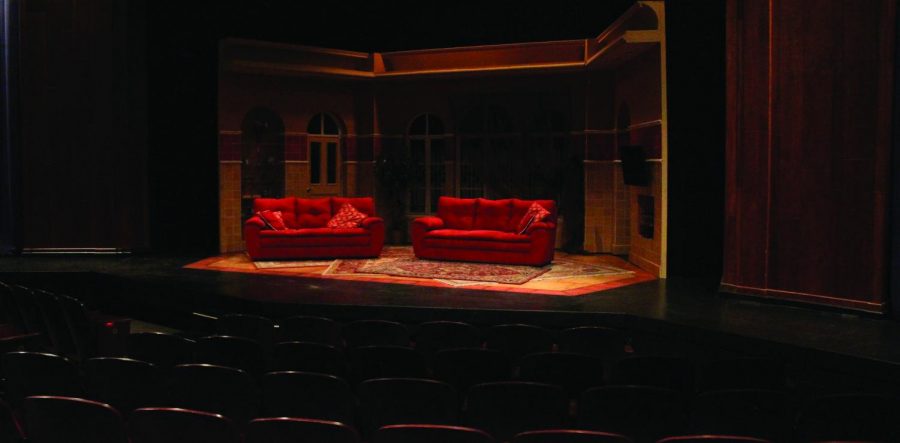Colgate Students Give a “Kiss” to the Community
The Colgate theater department presented the play “Kiss” at Dana Arts Center’s Brehmer Theater from November 11 to 15. “Kiss” was written by the contemporary Chilean playwright Guillermo Calderon. The Colgate adaptation was directed by Professor of English and the Director of the University Theater Adrian Giurgea. Seniors Dana Slosar and Leo Storous, along with juniors Grant Rosen and Julia Zsciesche, acted in “Kiss.”
The plot of “Kiss” centers around a play within a play. A theater production of what is believed to be a Syrian melodrama written in 2014, is put on by four actors. The production within the play, is produced by actors who don’t understand the material or the playwright’s motives. Thinking the play is a Syrian melodrama, they overlook the true meaning. Calderon understood that to write about Syria, a country whose language he did not speak and whose culture he only understood through secondary experiences, would be an
incredibly difficult task. To combat this, Calderon created the central plot of his play around a misunderstanding.
However, once the production within the play finished, the actors addressed the audience by stating that they located the playwright and her translator. At this moment, most audience members thought the play had ended. Many believed the actors talking were no longer reading a script, but rather Colgate students reflecting on their production. This illusion worked wonderfully; people easily forgot they were inside a play and instead accepted the unfolding events as a genuine, unscripted experience.
The actors brought out a large projector, and set up a Skype session with the playwright. The two women pictured on screen were refugees in Lebanon, and the audience was painfully aware of the difference in setting. The playwright was disguised with a wig and sunglasses. The actors began to ask questions, and the eagerness of the playwright began to dissipate; it soon became clear that the actors have grossly misinterpreted the play. As the questions became more politically oriented, the woman continuously looks over her shoulder and refuses to answer. The actors were oblivious to the political activism displayed by the playwright by writing against the Syrian government.
The shift in mood dramatically encompassed the audience. The carefree laughter occurring during the opening melodrama, quickly shifted to nervous glances and anxious whispers. The audience, mostly unaware that the playwright was an actor and not an actual refugee, became increasingly uneasy and began to shout out to the actors. Concerned shouts of, “She’s in Lebanon, she’s not allowed to say,” accompanied by whispers of “I’m so scared,” erupted throughout the audience.
“It was a roller coaster of emotions; you like the actors, you hate the actors and your heart breaks for the actors. When the play was finished, the audience was confused and speechless. People couldn’t move from their seats. It left the audience thinking and pondering for answers, and in my opinion, I think that’s a sign of a fabulous theatrical production,” first-year Catherine Berry said.
For Calderon, theater is not meant to exist for self-indulgent entertainment purposes. Instead, he uses it as a political platform to further understand important, widely reaching issues. “Kiss,” similar to third cinema, serves as a reactionary piece. Although not directly changing the landscape of the Syrian War, the play brings awareness and emotion to an otherwise sheltered audience. The audience serves as a reactionary body, not only with the actors, but amongst themselves.
“Before coming to this play, I was contemplating taking a nap. As a college student who loves sleep, I would go see this play instead of getting that extra sleep,” first-year Patrick Matulka said.






